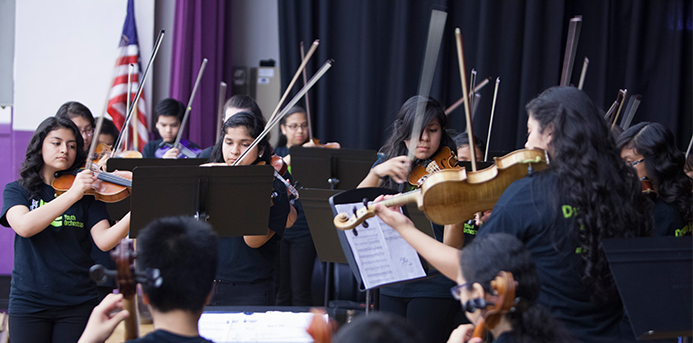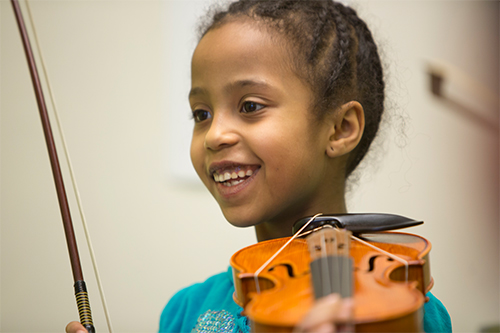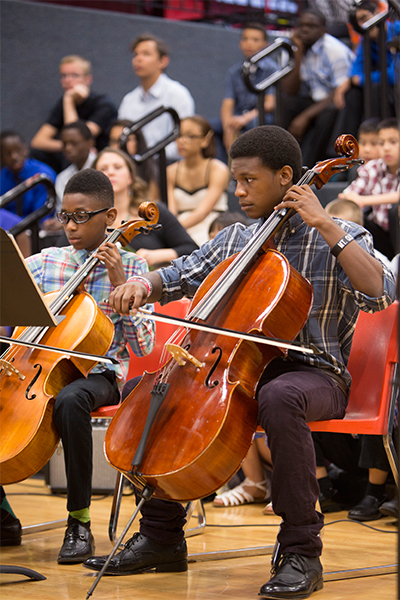Xaiver Quinn vividly remembers the moment he enrolled in The People’s Music School back in 2007. His mother had camped out in front of the school’s doors for hours prior to registration opening, maintaining a tradition nearly as old as the school itself. Camping out had not only become a norm, but also a necessity as both demand for spots — and the length of the line — grew each year.
The long lines soon posed a safety concern, especially during the winter registration months, and as of 2012 the school switched to a lottery-formatted registration process due to police pressure — a change that marked the first of many to come.
The People’s Music School, formed by Dr. Rita Simó in 1976, is the only completely free music program in Chicago that provides Chicago’s underserved children access to music education while exposing them to a thriving and empowering music community. This year, the nonprofit will celebrate its 40th anniversary with a birthday bash on Nov. 4 that will honor the school’s past, present and future through the theme of transformation.
“With transformation there’s often this push and pull between honoring the past and looking toward the future — you’re always juxtaposing the before and the after,” says Jennifer Kim Matsuzawa, president and artistic director of The People’s Music School. “I wanted to take a moment and celebrate where we are at right now … we have such an exciting future ahead of us, but let’s not forget the magic that is right now.”
Matsuzawa is quite familiar with transformation herself. She rejoined The People’s Music School in 2014 after working for Bain & Company — a global management consulting firm — for more than a decade.
Years prior though, back in 1996 when she was a student at Northwestern University, Matsuzawa interned and later taught at The People’s Music School. She says she decided to intern because she had never seen anything like the school before. “It just blew my mind.” She says the school shed light on the contradictory issue that while music is about “universality and connectivity,” in actuality it is very exclusive and inaccessible to learn how to play and pursue music in many cases. “When I came across the school I just knew that they were onto something,” she says. “I wanted to be a part of it.”
Matsuzawa interned around the time the school was only two decades old — a halfway point between its inception and now. She says 20 years ago the school had just built a new building, marking “a moment of hope and opportunity.” She adds, “It’s very similar actually to what I’m experiencing now, 20 years later. I feel that we’re on the cusp of something really big again.”
Since Matsuzawa rejoined the school, such big changes have already occurred. She reduced the school’s $200,000 deficit within six months of taking on her new role, and has also doubled the school’s number of students.
“Really what we had to do was a gut rehab, we had to fix the house,” she says. “The bones and structure were good and the programming was strong but we had to sort of fix everything else around it.”
Which is exactly what they did, just in time to celebrate. Aside from transformation, the more playful theme of the birthday bash is “Tonight’s So Bright,” which takes inspiration from The Smashing Pumpkins’ song “Tonight, Tonight” — a fitting choice considering the iconic band’s drummer, Jimmy Chamberlin, is the event’s honoree.
Chamberlin has been closely involved with the People’s Music School for a few years. Matsuzawa says when she first met him around the time she had taken on her new role, “it was obvious that though [the school] and Jimmy Chamberlin had not met before, they were kindred spirits.”
She says the school has always placed greater emphasis on helping children discover their self-worth through their love of music rather than solely being focused on creating future musicians. “That self-discovery process is so aligned with how Jimmy has approached his life overall,” she says. She continued to say he has had a “very intimate and close alignment with our mission for a long time,” and has helped the school out in many ways, from being a “spiritual guru of our mission,” to judging the school’s tech-centric Music Hack event last year.
Chamberlin says being honored as the school celebrates 40 years is incredible. “It’s really the greatest thing that has happened to me in a long time,” he says. He adds he has a powerful message for young people: “If you’re brave enough to visualize something, it can be attainable.” Which is precisely what he has done many times throughout his own life, as he has experienced countless life-altering transitions.
“I could be the poster boy for transition at any point in my life,” he says. It is a sentiment best evidenced from his journey into music and struggles in the ’90s with substance abuse to reinventing himself as a business leader and becoming the “squarest person” on his children’s school board. He says, “If that’s not transition, I don’t know what is.”
Through it all, he says his instrument has always remained his foundation, as looking at things in musical terms has helped in all aspects of his life.
“An understanding of composition and rhythm and harmony and narrative is so important in ascertaining the value of anything,” he says. “I think that this journey into music is something that penetrates and has tetherization to just about everything these kids are going to do.” He says encouraging the school’s students to contemplate why they are playing an instrument is most important.
“Why am I playing this, why am I making the choices I am making, and what’s the reason for trying to learn or ascertain why I am doing this?” he asks. Many kids often get caught up in perfection. “They want to develop techniques so they can be faster, better, stronger,” he notes, but says his message is to let them know the purpose of playing an instrument and the purpose for mastering technique is “to create a mechanism by which you can get what’s in your heart out onto the canvas of your instrument.”
He adds, “Those things that make you unique to yourself, the things that create your identity, are the things to be celebrated, not fixed with technical practice — because it is those inconsistencies in artwork that allow us to celebrate people as individuals.”
Which — aside from celebrating 40 full years of positive impact, steady growth and a bright future — is exactly what the birthday bash will call attention to. The school may be turning 40, but the influence it has had on its 10,000-plus students is timeless — the skills, awareness and appreciation gained will surely last a lifetime.
More from Make It Better:



